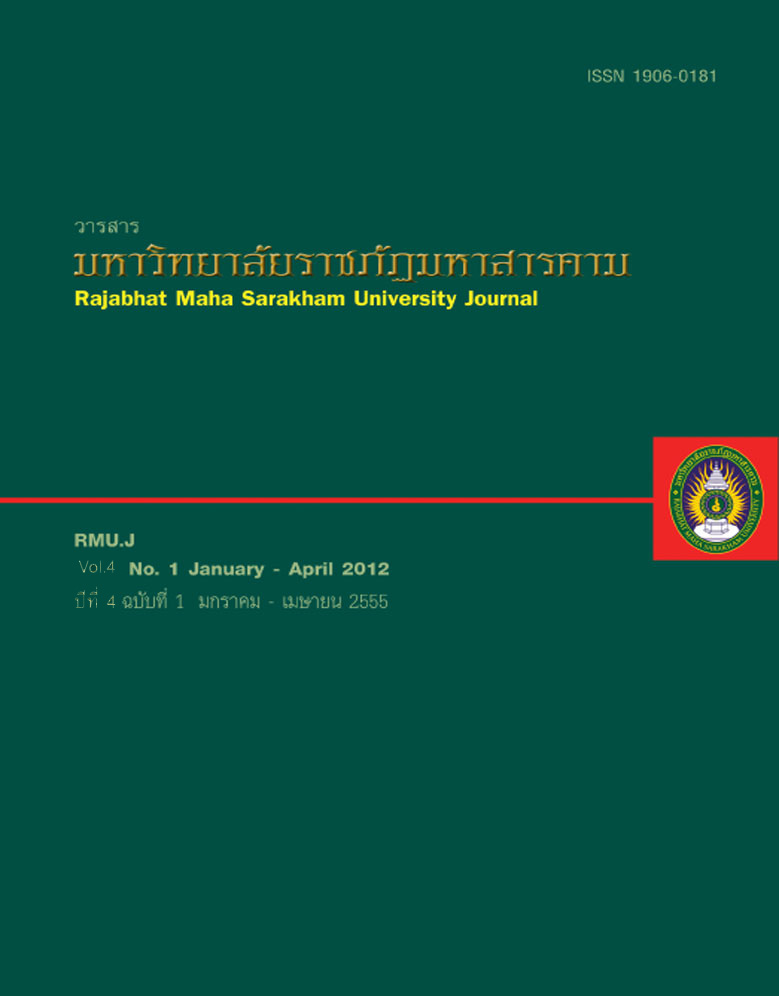การจัดประสบการณ์แบบโครงงาน สำหรับพัฒนาทักษะพื้นฐานทางคณิตศาสตร์ ของเด็กปฐมวัย Project Learning Experience for Pre-mathematics Skills Development of Preschool Children
Main Article Content
บทคัดย่อ
การวิจัยครั้งนี้มีวัตถุประสงค์เพื่อศึกษาการจัดประสบการณ์แบบโครงงานเพื่อพัฒนาทักษะพื้นฐานทางคณิตศาสตร์ของ
เด็กปฐมวัย กลุ่มตัวอย่างคือ เด็กปฐมวัยอายุระหว่าง 5-6 ปี จำนวน 32 คน เรียนชั้นอนุบาลปีที่ 2 ภาคเรียนที่ 1 ปีการศึกษา 2552
โรงเรียนอนุบาลมหาสารคาม สำนักงานเขตพื้นที่การศึกษามหาสารคาม เขต 1 ตำบลตลาด อำเภอเมือง จังหวัดมหาสารคามคัดเลือกกลุ่มตัวอย่างโดยวิธีการสุ่มแบบกลุ่ม เครื่องมือที่ใช้ในการวิจัยประกอบด้วย คู่มือการจัดประสบการณ์แบบโครงงาน
แบบประเมินพฤติกรรม แบบประเมินพัฒนาการทักษะพื้นฐานทางคณิตศาสตร์ แบบสัมภาษณ์ และใช้ระยะเวลาในการเก็บข้อมูลสัปดาห์ละ 5 วัน 4 สัปดาห์ ผลการวิจัยพบว่า
1. นักเรียนเลือกประเภทของสิ่งมีชีวิตสำหรับการจัดประสบการณ์แบบโครงงานเป็นดอกไม้และเลือกประเด็นที่จะ
ศึกษา คือ ชนิดของดอกไม้ ส่วนประกอบของดอกไม้ การนำดอกไม้ไปใช้ประโยชน์ การดูแลรักษา และการปลูก
2. การจัดประสบการณ์แบบโครงงานในระยะเริ่มต้นพบว่า นักเรียนมีประสบการณ์และข้อมูลเกี่ยวกับดอกไม้น้อย
จึงทำให้นักเรียนตอบคำถามและปฏิบัติกิจกรรมระหว่างการจัดประสบการณ์แบบโครงงานได้ไม่ดี สังเกตได้จากชิ้นงานไม่มีความ
หลากหลายและตอบคำถามแบบย้ำซ้ำเดิมคำตอบเพื่อน ในระยะการพัฒนาโครงงาน พบว่า นักเรียนเกิดการเรียนรู้มากขึ้นจาก
การปฏิบัติกิจกรรมด้วยตนเอง จึงทำให้นักเรียนสามารถปฏิบัติกิจกรรมได้คล่อง ชิ้นงานมีความหลากหลายและตอบคำถามได้
มากขึ้น ในระยะการสรุปและการประเมินการทำโครงงาน พบว่านักเรียนสามารถเลือกชิ้นงานและนำเสนอผลการทำโครงงาน
โดยการจัดนิทรรศการได้
3. นักเรียนมีพัฒนาการทักษะพื้นฐานทางคณิตศาสตร์ด้านการสังเกต จำแนก เปรียบเทียบ การเรียงลำดับ การนับ
เพิ่มขึ้น โดยมีค่าเฉลี่ยก่อนการทดลองคิดเป็นร้อยละ 42.03 และหลังการทดลองคิดเป็นร้อยละ 88.75 ผลการเปรียบเทียบทักษะ
พื้นฐานทางคณิตศาสตร์ของเด็กปฐมวัย พบว่าเด็กปฐมวัยที่ได้รับการจัดประสบการณ์แบบโครงงานทั้ง 3 ทักษะ มีพัฒนาการ
หลังเรียนสูงกว่าก่อนเรียนอย่างมีนัยสำคัญทางสถิติที่ระดับ .05
This research aimed to study project learning experience and develop pre-mathematics skills
for preschool children. The target group was 32 Kindergarten II children of 5-6 years old studying in the
first semester of the 2009 academic year, Anuban Maha Sarakham School, under Maha Sarakham
Office of Educational Service Area 1, Tombol Talad, Muang District, Maha Sarakham Province. The
cluster random sampling method was used for target group selection. The research instruments were 1)
manual for project learning experience, 2) project assessment form, 3) pre-mathematics skills
assessment form, and 4) interview protocols. Data collection was conducted for 4 weeks of 5 days
each. Findings are as follows:
1) The living thing topic which the preschool children selected for their project learning was
flowers. There were 5 sub-topics in which the children were interested: 1) names of the flowers, 2) parts
of flowers, 3) use of the flowers, 4) nurturing, and 5) planting.
2) At the initial stage of project learning, children had very limited experience and information
about flowers, so they did poorly answering questions and practicing in project learning activities. This
could be observed in their works lacking variety and repeated answers of their peers. However, during
the project development children learned more from their own practice in the activities. They were more
capable of handling activities, producing works of variety, and answering more questions. At the stage
of project conclusion and assessment, it was found that children were able to select and present their
project works through project exhibition.
3) Post-experiment assessment of the students’ pre-mathematics skills revealed significant
improvement over their pre-experiment results in observing, classifying, comparing, sequencing, and
counting; with the mean score of pre-experiment assessment being 70.23 as compared with the mean
score of 88.75 after the experiment. The improvement was statistically significant at the .05 level.
Article Details
1. บทความที่ลงตีพิมพ์ทุกเรื่องได้รับการตรวจทางวิชาการโดยผู้ประเมินอิสระ ผู้ทรงคุณวุฒิ (Peer Review) สาขาที่เกี่ยวข้อง อย่างน้อย 3 ท่าน ในรูปแบบ Double blind review
2. ข้อคิดเห็นใด ๆ ของบทความที่ลงตีพิมพ์ในวารสารมหาวิทยาลัยราชภัฏมหาสารคาม นี้เป็นของผู้เขียน คณะผู้จัดทำวารสารไม่จำเป็นต้องเห็นด้วย
3. กองบรรณาธิการวารสารมหาวิทยาลัยราชภัฏมหาสารคาม ไม่สงวนสิทธิ์การคัดลอกแต่ให้อ้างอิงแสดงที่มา


